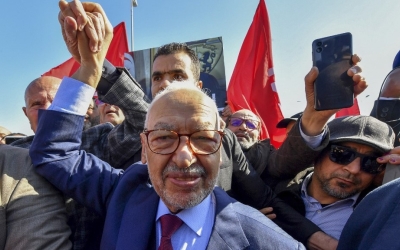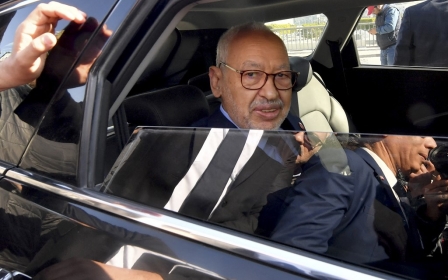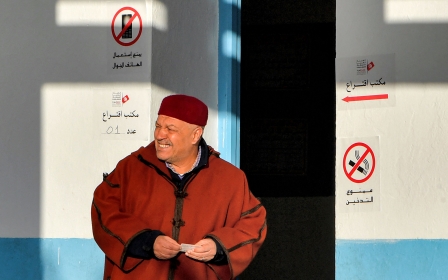Tunisia: Jailed opposition leader Rached Ghannouchi starts hunger strike

Tunisian opposition leader Rached Ghannouchi began a hunger strike on Monday in solidarity with other anti-government figures waging a protest fast to demand their immediate release, his party said.
Ghannouchi, 82, a fierce critic of President Kais Saied and head of the Ennahda main opposition party, was jailed last year on charges of incitement against police and plotting against state security.
Earlier this month, in a separate case, a judge sentenced him to three years in prison on charges of accepting external financing.
Ghannouchi's lawyers describe the cases against him as "unfounded and politically motivated".
"As he engages once again in this form of peaceful struggle, Mr. Rached Ghannouchi calls on all Tunisians to continue expressing their commitment to a democratic Tunisia," the Ennahda party said in a statement on behalf of his defense team.
New MEE newsletter: Jerusalem Dispatch
Sign up to get the latest insights and analysis on Israel-Palestine, alongside Turkey Unpacked and other MEE newsletters
"[One] that encompasses everyone on the basis of coexistence based on freedom, justice, the supremacy of the law, and the independence of the judiciary."
Arbitrary and politically motivated acts of repression have proliferated since Saied unilaterally suspended parliament and dissolved the government in July 2021.

A former constitutional law professor, Saied was democratically elected as Tunisia's president in 2019 and billed himself as an outsider who could take on Tunisia's established political parties. He oversaw a growth in democracy but also mounting economic challenges in the country of 12 million.
After the power grab, the plans for which were first revealed by Middle East Eye, Saied decided to rule by decree, a move his opponents and human rights groups decried as a "constitutional coup".
In recent months, opposition to Saied has grown largely due to unpopular economic reforms, soaring food prices and shortages of basic staples such as sugar, vegetable oil and rice.
In August, Saied sacked Prime Minister Najla Bouden late in the night without offering an explanation, and replaced her with Ahmed Hachani, a retired central bank employee who has shared articles on Facebook espousing conspiracy theories.
Middle East Eye delivers independent and unrivalled coverage and analysis of the Middle East, North Africa and beyond. To learn more about republishing this content and the associated fees, please fill out this form. More about MEE can be found here.




